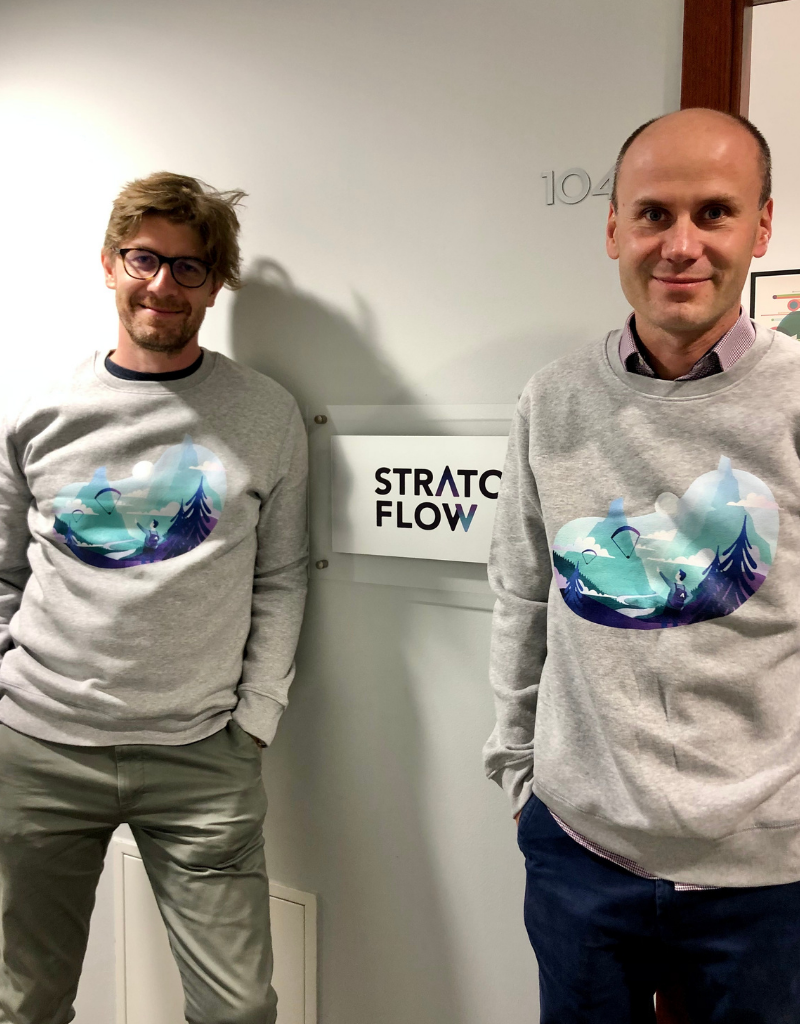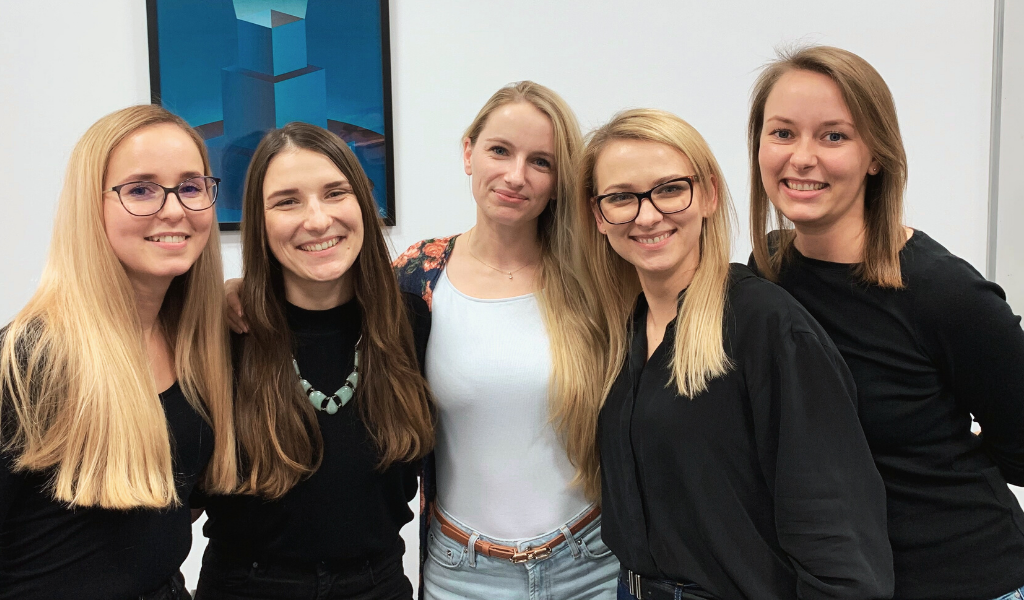
Working Environment in Stratoflow: 12 Questions to the CTO and Cofounder Arkadiusz Drysch
At Stratoflow, we build high-perfromance software. What exactly does it mean? What kind of company is Stratoflow? We bet no one knows it better than the founders themselves. We asked our CTO Arkadiusz Drysch about the working environment, company values, recruitment, and onboarding process. If you are wondering what it is like to work with us, this interview is a must-read for you.
Working environment in Stratoflow – an interview with Arkadiusz Drysch
Why is it worth working at Stratoflow?
This is a fundamental question and if it had been asked two years ago, I would have probably answered in a very clichéd way: an interesting project, cool people and family atmosphere. Although these answers are all true, they do not get to the heart of the matter. For example – the family atmosphere has never been an ultimate goal in itself, we have never aspired to be the place where everyone liked each other.
On top of that, we care about the lack of overtime and value a work-life balance. The family atmosphere and the fact that we all like each other are somehow a side effect… well, a side effect of what? Several months ago, we asked ourselves a question: what truly makes us like working together. And we devoted a lot of time to answer it thoroughly.
As a result, we identified the values we all identify with. They also represent what people we want to work with. What we have in mind is:
Craftsmanship – making sure that the solutions we create satisfy both the client and our engineering spirit.
Collaboration – a spirit of cooperation and understanding the fact that only by working as a team we are able to create something worthwhile.
Transparency – sharing information, being open to giving and receiving constructive feedback.
Responsibility – a sense of responsibility for our work, a proactive approach.
Coming back to the question, I think that it is worth working with us precisely because of the values we believe in, and we cordially invite everyone who shares them or at least aspires to it.

Stratoflow means high-performance software experts who work in modern Java. What does it mean in practice? What tech stack do you use?
Our main stack is based on Java 13+ and Spring Framework. The reason is simple — the development process is comfortable, easy to test, and quick to activate. We specialize in building high-performance software — systems to make complicated calculations on big data in specified time. It’s a narrow field, but there are still plenty of available technologies to choose from. What we value a lot is that the solutions we use allow us to quickly process data directly in CPU Cache and RAM memory.
Regarding our everyday solutions, we work with many kinds of distributed and concurrent processing engines. Those are In-Memory Data Grid (IMDG), Hazelcast (), Apache Ignite or Oracle Coherence.
When it comes to JAVA IDEs, most of our devs prefer IntelliJ.
Where is the Stratoflow office located?
Our office is literally a one-minute walk from the Wrocław Market Square. Similarly to many companies – the pandemic made us implement remote work and after a long period of working in this model, we have no doubts about its advantages. Currently, our employees can choose what suits them best – if someone prefers to work in an office, there will always be a guaranteed spot.

Could you please share some fun fact about the company?
I will share two interesting facts of completely different nature. The first is that the elevator in our office building allows you to go straight to the jazz club. It is amazing how fast you can travel between two completely different worlds!
The second fun fact – as part of our small R&D department, we have built an experimental ultrafast search engine for the Travel industry. Everything is written in Java and allows you to search large volumes of data in milliseconds.
What kind of projects can one expect working at Stratoflow?
Unfortunately, I am not able to give an unequivocal answer to this question, because… it depends. Each project is different, and this is also a basic characteristic of working at Stratoflow. However, programmers can be sure that they will use their competences by implementing projects for international clients from such industries as Finance, Travel, eCommerce, retail, healthcare, or Industry 4.0, IoT.
[Read also: How to Choose a Software Development Company – CHECKLIST]
What technology does the Stratoflow team use?
We always choose a specific technology for the specific problem. In practice, it is most commonly Java, because its ecosystem offers a very wide range of options for selecting specific solutions. Less frequently we create solutions in .NET, Golang or Python.
Typical solutions that we work with on a daily basis are all kinds of distributed and concurrent processing engines. Those are: In-Memory Data Grid (IMDG), queue engines, stream engines, as well as classic databases, which also often need to be optimized in terms of performance.
How many people work at Stratoflow and in what mode?
At the moment, the Stratoflow team, including Michał (CEO) and me, consists of 27 people and our organizational structure is flat. The vast majority work remotely, a dozen or so people in hybrid mode, and a few prefer to work from the office on a regular basis.

Is there a dress code in the office?
We do not have an official dress code, we want everyone to feel at ease. For some time now, more and more people have been coming to the office or showing up on webcams in our corporate sweatshirts, which we gave our employees a few weeks ago accompanying the process of rebranding.
How do technical people communicate with people from business, analytics, marketing, or management?
We do not create any barriers to communication between teams. The spirit of cooperation is very important, and we operate as one team, not camps on different sides of the barricade. We use the entire spectrum of tools for communication, depending on the needs. At the level of formulating requirements and knowledge management, these are tools such as Jira and ClickUp, and for ongoing communication we use Slack and online meetings.
When a topic arises that requires a live conversation, we make an appointment that suits everyone and meet in the office. On such days, we like to integrate and go out for lunch at our favorite Wroclaw bistros.

What kind of candidates are you currently looking for?
At the moment we have several open recruitment processes for the Java Developer position – both for juniors, mid, and seniors. Knowledge of specific frameworks or libraries is welcome, but not the most important. We care about people for whom programming is a natural state of mind and who understand various data processing models – this is a key feature when creating high-performance systems.
>Additionally, we really care that the people who join us share values, which I mentioned earlier.
I encourage you to read the job offer at Stratoflow in the careers tab. Along with the job offers, we placed photos of the team that quite well reflect the family atmosphere that prevails in our company.
What does the recruitment and onboarding process look like?
For each recruitment, we build a recruitment team that consists of 5-6 people from various teams. This gives the opportunity for both sides of the process to get to know each other better. Commitment, trust, and the fact that every vote counts increases the chances that the company will be joined by a person who will quickly feel at ease and feel the working atmosphere at Stratoflow.
We value live contact, so during onboarding we always invite a new employee for a few days in the office. If the person is not from Wroclaw, we cover all travel and accommodation costs.
We devote the first few days to the new person so that they can get acquainted with everyone they will be working with. We tell about the way the company works, how we organize our work, and we show the tools we use. On top of that, we prepare for the first project and pushing your first code changes to code repository.
We wrote more about recruitment and onboarding in the article “Our recruitment and onboarding process for software developers”.
What advice do you usually give employees when they encounter a difficult project?
It may not be the advice as such, but I will share my approach – in the case of complex projects, the ability to work in a team and share knowledge is key.
Recommendation corner – what industry blogs and books would you like to recommend?
I regularly read – and highly recommend – Scott Galloway’s No Mercy / No Malice blog. It is a great commentary on current events in the field of business, sociology, and economics.
The latest book, not necessarily industry-specific, but real food for thought, is Timothy Egan’s “The Worst Hard Time”. It is not an easy read – the theme is “Dust Bowl”, the period of drought and accompanying sand storms that hit the United States in the 1930s. The book is moving because it perfectly illustrates how dramatic the effects of over-exploitation of nature by man can be, which is particularly telling in the face of the climate crisis we are experiencing right now.
Working environment in Stratoflow – summary
We hope the talk inspires you to join Stratoflow and experience our working environment. Check our current job offers and apply via e-mail. If you have further questions about Stratoflow, don’t hesitate to contact us. We would love to hear from you!
Related Posts
- Pomoc IT dla NGO: Jak Stratoflow Wspiera Cyfryzację Procesów Organizacji Pozarządowej Otwarte Klatki
- Our recruitment and onboarding process for software developers
- How to Build an Inventory Management System: Key Steps and Tips
- How to Build a Document Management System: Alternative Approach
- Best Real Estate CRM Software in 2025
Thank you for taking the time to read our blog post!